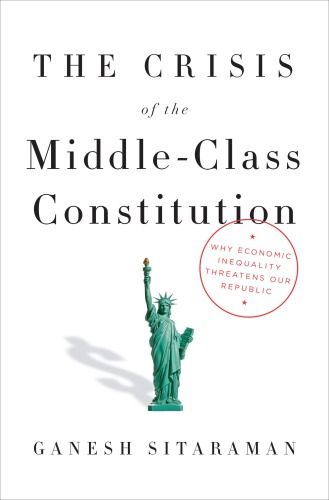
The Crisis of the Middle-Class Constitution
Why Economic Inequality Threatens Our Republic
کتاب های مرتبط
- اطلاعات
- نقد و بررسی
- دیدگاه کاربران
نقد و بررسی

February 1, 2017
The declining middle class represents not just a lost economic stratum, but the disappeared basis for the quaint idea of representative democracy.Rome, Venice, Great Britain: the first republics had their legal footings in constitutions premised on class warfare. By that outlook, a Hobbesian war of each against all pitted the interests of rich against poor, with not much to buffer the two. The genius of the American Constitution, writes Sitaraman (Law/Vanderbilt Law School; The Counterinsurgent's Constitution: Law in the Age of Small Wars, 2012), is that it "assumes relative economic equality in society [and] assumes that the middle class is and will remain dominant." Thus, he adds, the Constitution does not preclude the poor from entering, say, the Senate, even though practical reality may not encourage them. Yet, as he also notes, particularly in the years since the Great Recession, markers of inequality have become ever more pronounced; the government seems structured to benefit the interests of the wealthy at the expense of the poor, and the middle class is being squeezed. An adviser to Elizabeth Warren, and therefore on the left end of the left wing, Sitaraman is a proponent of government as an engine for economic reform. As he argues, it was government programs such as the GI Bill and modest home loans that built a strong middle class in the first place, a strong bulwark against the temptations of communism. In the new siege of the middle class on the part of the wealthy, he urges, the old fears of too much power in the hands of the government ought to be replaced by old but dormant fears of power in the hands of the very wealthy. Now, with "power increasingly concentrated in the hands of economic elites," the reality is squarely back in that class warfare that the Founders so desperately wanted to transcend. A blend of accessible economic theory and practical reform, of much interest to any reader whose common cause is with the 99 rather than the 1 percent.
COPYRIGHT(2017) Kirkus Reviews, ALL RIGHTS RESERVED.

October 1, 2016
Law professor Sitaraman, who's worked with Sen. Elizabeth Warren for nearly a decade, grounds his discussion of economic inequality in the history of constitutional republics. Because the nascent United States boasted fewer class divisions and greater economic equality than previous republics, argues Sitaraman, no provision was made in the Constitution for balancing class interests and blocking a power surge of the wealthy. Yet we've managed to balance those interests before and can do so again. With a six-city tour.
Copyright 2016 Library Journal, LLC Used with permission.

March 15, 2017
Sitaraman (law, Vanderbilt Law Sch.; The Counterinsurgent's Constitution) has produced an original monograph concerned with rising income inequality in the United States, arguing that a strong middle class is important to the structure of our government. The author indicates that the U.S. Constitution "assumes relative economic equality in society" and the founders made "no provision" preventing the upper class from seizing powers, as found in the constitutions of other countries. However, the author believes that wealthy Americans are currently doing exactly that, and that citizens must decide: "Will we accept oligarchy and the threat of demagogues and tyrants? Or will we work to restore the economic preconditions for our republic?" Economic fairness, according to Sitaraman, is a cardinal principle of the U.S. Constitution, and as Americans, we must not give up on that goal. Readers desiring further readings in the area of inequality might consult Thomas Piketty's widely acclaimed Capitalism in the Twenty-First Century, which argues that the mid-20th century was economically exceptional. VERDICT This book belongs in all libraries with holdings in political science, law, and economics. It will interest scholars and, to a lesser extent, general readers. [See Prepub Alert, 9/12/16.]--Claude Ury, San Francisco
Copyright 2017 Library Journal, LLC Used with permission.

























دیدگاه کاربران